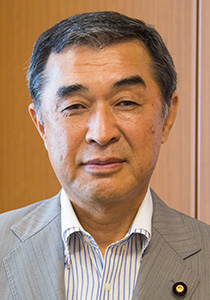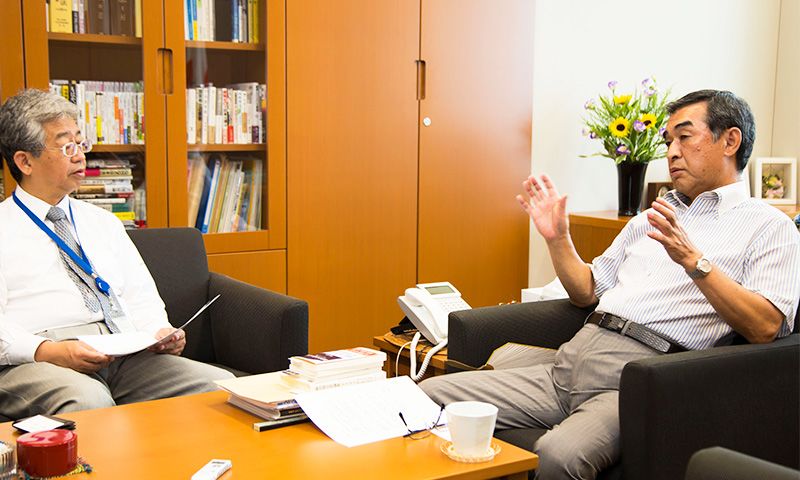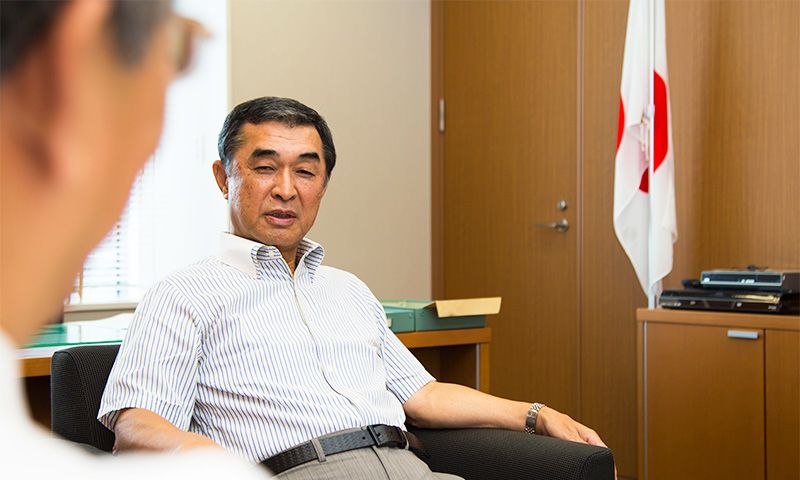
LDP Rebel Stands Firm on Addressing Vote Disparity
Politics- English
- 日本語
- 简体字
- 繁體字
- Français
- Español
- العربية
- Русский
A Lawmaker’s Responsibility
INTERVIEWER You’ve been a prominent member of the Liberal Democratic Party, serving as its secretary general in the House of Councillors and chairman of the upper house Diet Affairs Committee. But you broke ranks and voted against the electoral reform bill submitted by your party and chose to leave the LDP-led voting group. Can you tell us your motivations for your decision?
WAKI MASASHI Well, let me start by describing the situation faced by the House of Councillors. As you know, the Supreme Court ruled that the two most recent upper house elections were in a “state of unconstitutionality.” This means that although the elections were held under conditions so unfair as to be unconstitutional, we were given the benefit of the doubt—we didn’t have time to correct the situation. The court gave us a chance to make the changes necessary so that the next election would be in line with the constitutional guarantee of one person, one vote.
Three years ago, we made cosmetic changes, increasing the number of seats in two populous prefectures and reducing the number in two densely populated ones—with the promise in the bill’s supplementary provisions that we would undertake sweeping reforms before the next election. That’s a very serious promise. We’re lawmakers, and we would be acting totally irresponsibly if we can’t keep the promises in the laws that we make.
I chaired an upper house council on electoral reform and issued a draft proposal in April 2014 [combining 22 prefecture-based districts to narrow the votes-per-seat disparity to 1.83 to 1], asking all the parties to submit counterproposals. Members of my own party were flabbergasted and ignored our request.
Only Two Ways to Narrow the Gap
WAKI There are only two ways to close the gap in the value of a vote. One is to combine electoral districts—which are now arranged by prefecture—so that some districts span two or more prefectures. And the other is to elect all members through proportional representation. The LDP and the Democratic Party of Japan were both of the opinion that the current system of electing members through both local constituencies and proportional representation should be left intact so as to broaden the pool of candidates. This meant that a proposal to elect all members through proportional representation would never pass, and our only option was to go with the idea of combining prefecture-based districts.
As a member of the Diet, I couldn’t propose a plan if I weren’t sure it would be judged constitutional. Some people might think that’s naïve, but as someone charged with making the laws of our country, I couldn’t imagine doing otherwise. I didn’t want to lend my support to a bill that I knew could be judged unconstitutional, so that’s why I chose to leave the LDP’s voting bloc.
INTERVIEWER In the press conference announcing your decision, you said you were disappointed by the vehement criticism voiced by your LDP colleagues, which exposed a fundamental lack of commitment to compliance with the law.
WAKI I found it disgraceful. Prime Minister Abe often talks about the importance of the rule of law, and it was based on the need to address the legal concerns expressed by the Supreme Court that we were instructed three years ago to make sweeping changes to the upper house electoral system. But this turned out to be mere talk. Any attempt to take action was fiercely resisted. The opposition parties all submitted counterproposals, some more willingly than others, as we requested, but there was no response from the LDP. Ultimately, the party merely backed a plan drafted by four opposition parties. If lawmakers have no qualms about disregarding the laws they create, I’d say that the very foundations of our system of governance may be crumbling. I’m quite troubled by the reactions of my Diet colleagues.
The Upper House as a Safety Valve
INTERVIEWER The House of Councillors was launched as the “seat of good judgment.” But the electoral reforms of the 1990s created a system of electoral districts and proportional representation, not unlike that for the House of Representatives, and diminished the difference between the two chambers. Some contend that the upper house has become too powerful. Do you think the upper house should have a clearly differentiated role from that of the lower house?
WAKI The bicameral system means there’s more time to discuss each piece of legislation. Some contend that government would become more efficient with just one legislative chamber, but that has its dangers. If the DPJ were allowed to implement all its policies when it was the government party, for example, it would have forced through bills that were seriously flawed. Some DPJ legislators, I feel, espouse views that are quite extremist. Judging by the results of the upper house election after the DPJ’s rise to power, when it failed to secure a majority, the public seems to share my concern.
So the upper house can act as a safety valve in a democracy, allowing voters to voice their objections to an administration without having to wait until the next lower house election, which may be four years away. The increased opportunities for the public to express its will can prevent administrations from implementing whatever policies they please on the strength of majority support in the Diet. That alone is reason enough to keep the upper house.
Another important role is to consider policy from a longer-term perspective, since upper house members face an election only once every six years, unlike their counterparts in the lower house, which may be dissolved at any time. To take full advantage of the arrangement, though, you’d have to assemble a diverse field of highly capable candidates.
Some people advocate creating different electoral systems for the two houses in view of their divergent roles, but I disagree. Different roles don’t mean we need different systems. I happen to believe that the current system is a good one that ensures a modicum of diversity. Proportional representation candidates are those endorsed by various interest groups, while those running from electoral districts are endorsed by the party’s local branches. All party headquarters needs to do is approve those nominees. It’s a highly efficient and effective system that gives stakeholders considerable say in the electoral process.
A Constitutional Amendment?
INTERVIEWER One objection to the idea of bundling prefecture-based districts together was that it makes light of the differing needs of each prefecture, particularly those that are sparsely populated. If it is unconstitutional for residents in the less populated areas to have more voting power than urban dwellers, these critics say, then we should amend the Constitution.
WAKI I’m not against the idea of a constitutional amendment. The people who are demanding that each prefecture should be guaranteed at least one councillor have a legitimate argument. But as long as the Constitution remains unchanged, the current vote disparities must be rectified.
The Supreme Court has basically said that the present system is unconstitutional, so we have to abide by its verdict. In a country where the rule of law prevails, that’s a must. The court’s ruling clearly indicates that the prefecture-based districts have to be reformed.
Members of the public have every right to insist on ensuring there is at least one councillor from every prefecture. But those of us in the public sector must respect the decisions of the Supreme Court. For cabinet members to insist on all prefectures being represented in the upper house shows their lack of awareness of their status as government officials.
Resistance from the LDP
INTERVIEWER When faced with the same problem, the lower house chose to commission a panel of outside experts to draft a reform plan. Why did the upper house insist on carrying out the reforms on its own?
WAKI I don’t think it necessarily reflects a difference in the two chamber’s orientation; the personal views of members at the time were probably a bigger factor. When I was asked to chair the council for upper house electoral reform, I told my council colleagues at our first meeting that as members of the Diet—the highest organ of state authority—we should be able to determine our own fate. I asked everyone to contribute their knowledge and experience in drafting a decent reform plan, and both the ruling and opposition members agreed.
In connection with the reform efforts in the lower house, I told a meeting of LDP executives that I would rather give up my Diet seat than relinquish my lawmaking responsibilities to outside experts, particularly over reforms that will have a direct bearing on us personally as Diet members. After all, creating important rules for our country is what a lawmaker is supposed to do.
One difference with the lower house is that we serve six-year-terms, so we get to know each other better, including people in other parties. We can develop working relationships with them and conduct reasoned debate. I think we managed to do that in our council. I drafted a proposal that would have narrowed the vote disparity to within 2.5 to 1, but the LDP wouldn’t accept it. My colleagues in the party were the least enthusiastic about undertaking sweeping reforms.
Walking a Tightrope
INTERVIEWER The reform bill that was enacted still leaves open the possibility that the next election will be judged unconstitutional. That would be a major embarrassment for the upper house.
WAKI There are no assurances that the compromise agreement will be deemed constitutional. It’s certainly better than nothing, and it does go a long way to mitigate the inequalities in voting power. But considering the voting records of the members of the Grand Bench, nine of the fifteen justices may still find the reform plan inadequate, especially the four who were against the most recent “state of unconstitutionality” ruling. We’re walking a tightrope.
If the court does decide that the next election is unconstitutional, then we can anticipate additional lawsuits demanding that the lawmakers who voted in favor of the compromise bill be stripped of their qualifications to serve as elected officials. I would agree. I think they should step down from the Diet.
(Originally written in Japanese based on an interview conducted by Harano Jōji, representative director of the Nippon Communications Foundation, on July 28, 2015, and published on July 31, 2015.)electoral system House of Councillors bicameral system vote disparity Supreme Court Public Offices Election Act


